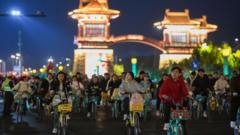As the sun set over central China, what began as a spontaneous quest for breakfast dumplings turned into a night of chaos and gridlock. The "Night Ride to Kaifeng" trend, initiated by four university students seeking to indulge in guantangbao, a type of soup dumpling, quickly spiraled into an overwhelming wave of cyclists journeying from Zhengzhou to the historic city of Kaifeng.
Initially praised in state media as a reflection of youthful exuberance, the movement became a double-edged sword. Tens of thousands of participants flooded a six-lane expressway, quickly leading to severe traffic congestion as police struggled to manage the overwhelming influx of bicycles.
Cyclist Ms. Li recounted her nostalgic joy amidst the chaos, noting the energetic atmosphere reminiscent of her college days: “Everyone was beaming with energy and interacting with people around them.” However, the elation soon turned into frustration as many cyclists found themselves trapped in traffic. Reports suggested that the journey, typically under one hour by car, stretched to three hours, with some riders abandoning their bikes altogether or struggling to find accommodation in Kaifeng due to overwhelming demand.
Despite the excitement of the ride, discontent brewed among participants, with some expressing regret over their decision to join the event after facing backlash from local residents. One rider lamented their experience on social media after hearing negative comments from a restaurant owner about college students, stating, “I’m really sorry for affecting the people in Kaifeng.”
In response to the situation, major bike rental companies urged riders to consider alternative transportation, such as trains or buses, and new restrictions were imposed by universities in nearby Zhengzhou. Local authorities, wary of spontaneous gatherings leading to potential unrest, took steps to close main cycling lanes in both cities in the aftermath.
As a generation grappling with economic uncertainty looks for moments of joy, the Night Ride to Kaifeng exemplifies both the spirit and the struggle of China’s youth. Ms. Li believes that despite the challenges, events like these fulfill a deep-seated need for connection and enjoyment amidst life’s pressures. “People are so stressed these days, so these events are a good thing,” she reflects, “because happiness is infectious.”

















